Buying a House in Japan Vs. Renting
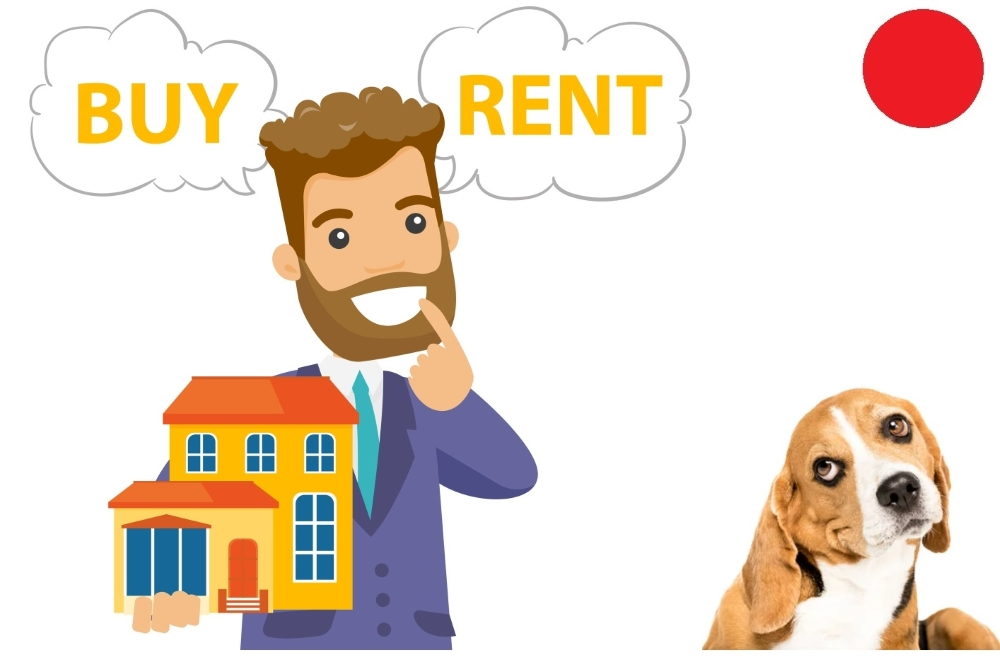
This article is for ex-pats who are debating with themselves about buying a house in Japan.
Many foreigners who plan to stay for the long term in Japan wonder if they should buy a house or apartment or rent a place. I myself spent over a decade as an ex-pat living in rented apartments before finally buying a house in Japan. The main reason behind this debate is Japan’s real estate depreciation.
In many other countries, the decision to purchase or rent a house is easier than in Japan because house prices typically appreciate over time, which is quite different from the housing market in Japan.
If you are sure your house’s value will appreciate over time, you would like to take advantage of this instead of throwing away a good chunk of money in rent.
However, even if the value of your house depreciates, if the depreciation is much less than the sunk cost of the total rent over a period of time, buying a house would make perfect sense in Japan.
This article will discuss the pros and cons of renting vs. buying a house or an apartment in Japan. We will also discuss the various financial aspects and whether buying an apartment or house makes sense considering real estate depreciation.
We will also provide a calculator to help you decide on your option, considering various financial implications. You can directly jump to the calculator.
However, let’s first see why the house prices depreciate in Japan instead of appreciating.
Why do Japanese Houses Depreciate?
In Japan, particularly for detached houses, the value of the building itself tends to decrease rapidly after purchase. Here are some key reasons why:
Wooden Houses
In Japan, standalone houses are mainly made of wood instead of steel and concrete. Unlike concrete, wood is more prone to delay due to natural reasons such as moisture and water damage, fire, and decay caused by mold growth and termites.
The comparatively low durability of wooden houses is a natural reason for their depreciation.
Cultural Attitudes Toward Buildings
Many Japanese people view homes, especially standalone houses, as consumer goods rather than long-term investments. Buildings are often considered to have a short lifespan, typically around 30 to 40 years for wooden houses, after which they are often torn down and rebuilt.
This Japanese cultural attitude is not limited to standalone wooden houses but even to multistoried steel and concrete apartment buildings. It is associated with the Japanese people’s natural risk aversion. However, there are some practical reasons, as described below.
Japan has a cultural preference for new, modern homes, which means older homes lose value more quickly. Buyers tend to favor newly built homes with the latest technologies and designs, and the used home market is smaller in comparison.
(You may also like to read about buying an Akiya or abandoned houses in Japan.)
Natural Disasters and Building Code
Earthquakes and other natural disasters are a constant concern in Japan. Building codes are frequently updated to ensure homes meet the latest safety standards. This makes older homes considered less safe, reducing their value over time.
Depreciation Model
Similar to how cars lose value as soon as they leave the dealership, homes in Japan often lose a significant portion of their value within the first 10 to 20 years. The land, however, may retain or even increase in value, depending on its location, but the building itself is usually seen as a depreciating asset.
This stands in contrast to places like the U.S. or Europe, where well-maintained older homes can appreciate in value over time.
For expats planning a long-term stay, renting or purchasing a house in Japan involves various factors that depend on personal preferences, financial situations, and lifestyle goals. Here’s a breakdown of the pros and cons of each option to help in making the right decision:
Renting an Apartment or House
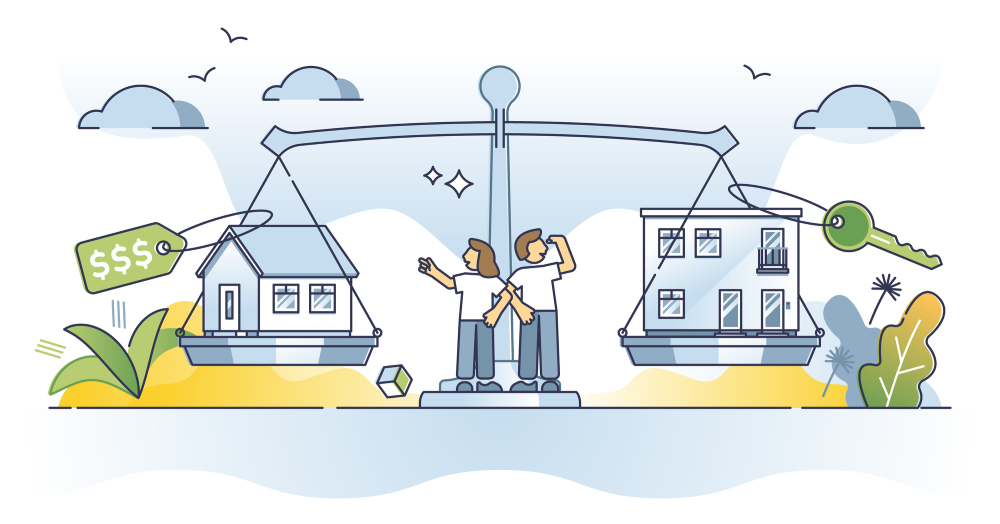
Pros of Renting:
- Flexibility: Renting allows for more flexibility, especially if you might change jobs, relocate to another area, or return to your home country.
- Lower Upfront Costs: Renting avoids the large upfront costs of buying, such as a down payment, registration fees, and taxes. Upfront costs for renting in Japan are much lower than buying a house or apartment.
- No Maintenance Costs: You won’t have to pay for building maintenance, repairs, or renovations, which can be costly over time.
- Uncertainty with Future Plans: If you’re unsure of your future in Japan, either in terms of job or length of stay, renting might be a safer option. It avoids the risks of property depreciation, especially since buildings lose value in Japan.
Cons of Renting:
- Sunk Cost: Renting doesn’t build equity, so the money spent won’t result in ownership or possibilities of long-term financial gains. The rent paid over the years is a sunk cost.
- Rent Increases: Rental prices increase over time, especially in desirable urban locations like Tokyo, Osaka, or Yokohama. You may check this guide about rents in Tokyo.
Purchasing an Apartment or House in Japan
Pros of Buying:
- Saving that Cost: Unlike rent, which is a 100% sunk cost and can be a huge amount over the years, even with any depreciation, your sunken cost should be much less. While the building may depreciate, land in high-demand areas (like Tokyo) may appreciate, allowing you to build some equity over time.
- Long-term Stability: Owning a home offers long-term stability, especially if you plan to settle in Japan for many years. You won’t have to worry about rising rents or moving and transporting your household every time you have to move to a new rental accommodation.
- Customization and Renovations: Owning allows you to renovate or customize your home according to your preferences, which is not an option with renting.
- Retirement: If you plan to retire in Japan, owning a home with an affordable fixed-rate mortgage may be much better than continuing to pay the rent.
Cons of Buying:
- Property Depreciation: As discussed above, the apartment or the building of a standalone house always depreciates in Japan. Land, especially in rural or less desirable areas, might not appreciate much, if not at all.
- Upfront and Maintenance Costs: Purchasing involves high upfront costs like down payments, real estate agent fees, and taxes. Homeowners are also responsible for maintenance, repairs, and house taxes.
- Commitment to Location: If you purchase, it ties you to one location, which can be limiting if your job or life circumstances change. Selling a house or apartment in Japan can be a slow process, especially if the building is older.
- Mortgages for Expats: It can be harder for foreigners to secure a mortgage in Japan, and some banks may require permanent residency or a Japanese guarantor.
Renting or Buying: Which is Better?
- If You Plan to Stay for 10+ Years: Buying a house in Japan may make more sense if you plan to stay in Japan for a decade or longer, especially if you find a house in a desirable location where land prices may appreciate. You’ll likely save on rent over the long term and gain stability.
- If You Want Flexibility: Renting might be a better option if you’re unsure of your long-term plans or foresee potential relocations. You’ll avoid the financial risks and responsibilities of homeownership, especially given Japan’s unique depreciation of housing structures.
Ultimately, purchasing makes the most sense if you’re confident in your long-term stay, have financial stability, and find a good house or apartment in a location where land values are likely to be appreciated (like major cities). However, renting gives you more freedom and less financial commitment if your future in Japan is uncertain.
If you’re thinking about buying a house, it might be a good idea to consult with a real estate professional to evaluate mortgage options, especially since some banks have specific conditions for expat buyers.
When flexibility is not a major concern, and the comparison is mainly between the depreciation of a purchased property and the rent paid over time, the financial decision depends on several factors. Here’s a more detailed breakdown to help evaluate which option might make better financial sense.
Should I Buy an Apartment or a House?
In any other country, buying a house may always look more attractive; however, in Japan, it may not be the case. Let’s see the apartment vs. house comparison in Japan:
- Apartment (Condominium): Apartments in large cities tend to retain their value better than houses, particularly because land prices are higher in urban areas. Condos also often come with shared facilities, like gyms or meeting rooms. However, monthly maintenance fees and repair fund contributions (修繕積立金, “shūzen tsumitatekin“) are required. Moreover, in apartments or mansions, as they are called in Japan, you must pay monthly rent for vehicle parking.
- House: A standalone house will give you more space and privacy, especially if you plan to live in suburban or rural areas. However, the value of the building will depreciate more rapidly than that of an apartment, and maintaining a house is costlier. However, you should also consider your savings on the monthly rent for car parking. In Tokyo and Greater Tokyo, the monthly car parking rent in your purchased mansion may range from 10,000 to 40,000 Japanese yen or more in expensive neighborhoods [Source].
Key Financial Considerations for Buying
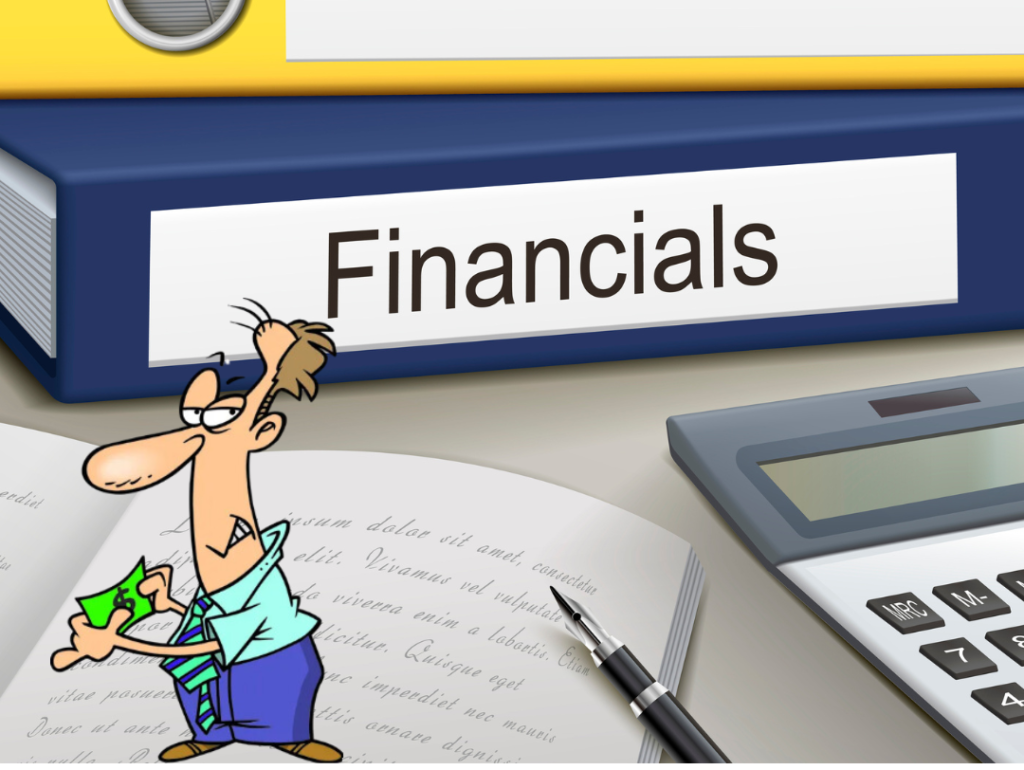
We discussed the pros and cons of buying a house in Japan. However, with all the theoretical pros and cons, how do we make a practical decision about whether to buy a house or continue living in a rented place?
Well, to make such a decision, we need to do a deep dive and analyze various financial implications.
Variable Factors for Decision-Making
Some of the variables the financial analysis will need are as follows:
- The city you are living in
- How long do you plan to stay in Japan
- What rent are you paying
- What is the range of price you are targeting to buy your house for
- If you decide to leave Japan after the intended stay, do you wish to sell the house and use it commercially?
Let us discuss different scenarios to help you decide between buying a house in Japan. For this exercise, we will consider the following constants and one variable:
- City: Major metropolitan areas like Tokyo, Yokohama, etc.
- Cost of the house or apartment: JPY 50 million
- Monthly rent: JPY 150,000
- Variable time frame you intend to live in the house: 30 years, 20 years, 15 years, or 10 years
As you must have observed, we used only the timeframe as the variable and kept the house’s price and the current rent you are paying constant.
Furthermore, in this guide we are using Tokyo or major metropolitan areas like Yokohama or Osaka for the cost comparison. The reason is that if you are not targeting the downtown area of, say, Tokyo, You can expect a decent house of around 75 to 80 sq meters for around 50 million Japanese yen in the outer periphery or Suburbs of Tokyo.
Similarly, if you live in a 2 or 3 LDK house in the above-mentioned areas, the rent would be around 130,000 to 150,000 in the outskirts. The rents will be significantly higher downtown.
Moreover, if you are buying a house with a Bank loan, you can expect a monthly payout of roughly JPY 150,000, which is close to the rent you may be paying.
Please note that we need to make the above assumptions as it is practically impossible to consider each and every variable. However, to enable you to use more exact data, we have a financial housing calculator later in this article to help you make a better decision.
Assumptions:
- Purchase Price: ¥50 million (¥40 million for the house, ¥10 million for the land).
- Depreciation: The building (house) depreciates over time, while the land may hold or slightly appreciate in value.
- After 10 years, the house depreciates by 30%.
- After 15 years, the house depreciates by 50%.
- After 20 years, the house depreciates by 60%.
- Assuming Urban Area with Moderate Land Appreciation
- Mortgage Terms: ¥50 million loan, 1% interest rate, 30-year mortgage (monthly payment ≈ ¥160,000).
- Rent: ¥150,000 per month, which remains stable over the years.
- Resale Value: The land remains at ¥10 million, and the house depreciates according to the above schedule.
- Other Costs (maintenance, property taxes, etc.) will be excluded to simplify the comparison.
Comparative Financial Scenarios
30-Year Financial Comparison
Buying a House in Japan (30 Years Stay)
- Initial Purchase Price: ¥50 million (¥40 million for the house, ¥10 million for the land).
- Depreciation: After 30 years, the house value might be only ¥10 million, but the land could still be worth ¥10 million or more.
- Selling After 30 Years: Total value = ¥10 million (building) + ¥10 million (land) = ¥20 million.
- Monthly Mortgage Payments: ¥160,000 over 30 years = ¥57.6 million total mortgage cost.
- Net Cost: ¥57.6 million (mortgage) – ¥20 million (resale value) = ¥37.6 million over 30 years.
Renting a House
- Monthly Rent: ¥150,000 over 30 years = ¥54 million total rent paid.
- Net Cost: ¥54 million over 30 years.
Comparison
- Buying: After factoring in mortgage payments and resale value, the total cost of buying could be ¥37.6 million over 30 years.
- Renting: The total cost of renting could be ¥54 million over 30 years.
20-Year Financial Comparison
Buying a House in Japan (20 Years Stay)
- Mortgage Payments: ¥160,000 × 12 months × 20 years = ¥38.4 million total mortgage payments over 20 years.
- House Depreciation: After 20 years, the house value has depreciated by 60%, so the house is now worth:
- ¥40 million × (1 – 0.60) = ¥16 million (house) + ¥10 million (land) = ¥26 million total resale value.
- Net Cost: ¥38.4 million (mortgage payments) – ¥26 million (resale value) = ¥12.4 million (net cost).
Renting a House
- Rent Payments: ¥150,000 × 12 months × 20 years = ¥36 million total rent paid over 20 years.
- Net Cost: ¥36 million (all costs sunk in rent).
15-Year Financial Comparison
Buying a House (15 Years Stay)
- Mortgage Payments: ¥160,000 × 12 months × 15 years = ¥28.8 million total mortgage payments over 15 years.
- House Depreciation: After 15 years, the house value has depreciated by 50%, so the house is now worth:
- ¥40 million × (1 – 0.50) = ¥20 million (house) + ¥10 million (land) = ¥30 million total resale value.
- Net Cost: ¥28.8 million (mortgage payments) – ¥30 million (resale value) = ¥1.2 million (net cost).
Renting
- Rent Payments: ¥150,000 × 12 months × 15 years = ¥27 million total rent paid over 15 years.
- Net Cost: ¥27 million (all costs sunk in rent).
10-Year Financial Comparison
Buying (10 Years Stay)
- Mortgage Payments: ¥160,000 × 12 months × 10 years = ¥19.2 million total mortgage payments over 10 years.
- House Depreciation: After 10 years, the house value has depreciated by 30%, so the house is now worth:
- ¥40 million × (1 – 0.30) = ¥28 million (house) + ¥10 million (land) = ¥38 million total resale value.
- Net Cost: ¥19.2 million (mortgage payments) – ¥38 million (resale value) = ¥18.8 million (net cost).
Renting
- Rent Payments: ¥150,000 × 12 months × 10 years = ¥18 million total rent paid over 10 years.
- Net Cost: ¥18 million (all costs sunk in rent).
Summary of Results (Purchasing Vs. Renting)
| Duration | Buying (Net Cost) | Renting (Net Cost) | Net Gain if You Buy |
| 10 years | ¥18.8 million | ¥18 million | -¥0.8 million |
| 15 years | ¥1.2 million | ¥27 million | ¥25.8 million |
| 20 years | ¥12.4 million | ¥36 million | ¥23.6 million |
| 30 years | ¥37.6 million | ¥54 million | ¥16.4 million |
Note: For a 10-year period, buying a house in Japan results in a financial situation that is approximately breakeven compared to renting.
Why the Buying Net Cost Drops So Much at 15 Years:
- The low net cost of buying at the 15-year mark (¥1.2 million) happens because you’re paying off a significant portion of the mortgage, and the property still retains considerable value (¥30 million after depreciation). This leads to a near-break-even situation when selling the property.
- In contrast, over shorter periods (like 10 years), the property hasn’t depreciated as much, and you haven’t paid down enough of the mortgage to offset the costs. Similarly, over longer periods (20-30 years), the house depreciates more, and the total cost increases due to continued maintenance and mortgage payments.
Calculator: Renting Vs. Buying a House in Japan
You can use the following calculator to get a better cost comparison of renting vs. buying a house in Japan:
| Result | |
| Total Rent Paid (¥): | |
| Monthly Mortgage Payments (¥): | |
| Total Mortgage Payments (¥): | |
| Total Maintenance Costs (¥): | |
| Property Depreciation (¥): | |
| Total Cost: If Buying (¥): | |
| Money You Can Get Back by Selling (¥): | |
| Net Cost in Buying (¥): | |
| Net Gain Compared to Renting (¥): | |
Tips About Housing Taxes and Other Costs
1. Annual Maintenance Costs:
- Applicable to Both Houses and Apartments:
- Homeowners handle maintenance for houses, so annual maintenance typically ranges from 0.5% to 1% of the property value.
- The management company usually handles this for apartments or mansions, and it can range from 1.5% to 2% of the property’s value annually or be bundled into the management fees.
2. Property Tax (Fixed Asset Tax):
- Applicable to Both Houses and Apartments:
- The fixed asset tax is generally 1.4% to 1.7% of the property’s assessed value (land and building).
3. City Planning Tax:
- Applicable to Both Houses and Apartments:
- The city planning tax for housing in Japan is usually capped at 0.3% of the assessed value and applies to properties in urban development areas.
4. Sinking Fund:
- Only Applicable to Apartments:
- The sinking fund is a monthly fee collected by the condominium management association to cover future repairs to shared areas (such as the building’s exterior, roof, and elevators).
- The fee typically ranges from ¥10,000 to ¥20,000 monthly for apartments.
5. Management Fees:
- Only Applicable to Apartments:
- A management fee is charged for the day-to-day maintenance of shared areas (e.g., cleaning, security, and utilities in common areas).
- The management fees for an apartment generally range from ¥15,000 to ¥30,000 monthly.
Note: check this guide for detailed ideas about real estate taxes.
Conclusion: Buying Vs. Renting
- Buying generally results in better financial outcomes compared to renting, even over shorter periods like 15 years, assuming stable land prices.
- Renting accumulates substantial costs over time, with no equity or asset to show for it.
- After 20 years, while the depreciation of the property makes buying less attractive, it is still financially more favorable than renting, especially if land values hold steady or appreciate slightly.
Mortgage vs. Rent Payments
- With low interest rates in Japan (as low as 1-2%), monthly mortgage payments might be comparable or even lower than rental payments, depending on the loan amount and interest rate.
- For example, a ¥50 million loan at a 1% interest rate over 30 years would result in monthly payments of about ¥160,000-170,000—similar to rent for a decent apartment in an urban area.
- The difference is that with a mortgage, a portion of the monthly payments goes toward building equity in the property (land, in particular), whereas rent does not.
Resale Value and Land Appreciation
- In urban areas (e.g., central Tokyo, Yokohama, Osaka), land prices may increase, which can offset the building’s depreciation.
- In less desirable or rural areas, both the building and land might depreciate, meaning the resale value could be low.
- If the land value appreciates, you could sell the property at a profit or recover part of the initial investment.
Additional Factors to Consider
- Maintenance Costs: As a homeowner, you’ll need to account for maintenance and repairs. This might amount to around 1-2% of the property value annually, adding some extra costs over time.
- Property Taxes: In Japan, you’ll also need to pay property taxes, which are around 1.4% of the assessed value of the land and building each year.
- Investment Alternatives: If you don’t buy, you could invest the money elsewhere. If alternative investments (stocks, bonds) provide better returns than the value gained by owning property, renting could make more sense.
- Risk of Land Depreciation: In some areas, even the land might depreciate. For instance, rural properties or homes in smaller towns may lose value across the board. In such cases, renting would be a better option, as owning a depreciating asset might result in a loss.
Till now, we discussed the option of selling your house if you plan to leave Japan. However, you can always have the option to keep the house and put it on rent.
Advantages of Renting Out Your Property After Leaving Japan
- Income Generation: By renting out your house, you can generate a steady stream of rental income, which could help cover mortgage payments, maintenance costs, property taxes, and other expenses.
- If the rental income exceeds your expenses, it can even generate profit.
- Rental yields vary by location, but urban centers like Tokyo, Osaka, and Yokohama tend to have stronger rental markets and higher yields.
- Holding Onto Land Value: While the building depreciates over time, the land retains value and could be appreciated in prime locations. Renting allows you to hold onto the property until a more favorable time to sell (if land prices increase).
- Covering Mortgage Payments: If the rent is high enough, it can cover most or all of your mortgage payments, allowing you to essentially own the property with the tenant’s rent paying down the loan.
- Flexibility to Return: Renting the property allows you the option to return to Japan and live in it again at a future time without the need to buy a new home.
Challenges of Renting Out Property in Japan
- Managing a Rental from Abroad: Managing a rental property from overseas can be challenging. You’ll likely need to hire a property management company to handle tenant relations, maintenance, and collecting rent. Property management fees are typically around 5-10% of the rental income.
- Vacancy Risk: There is a risk of having vacant periods where the house is not rented out, which means you would still need to cover mortgage payments, property taxes, and maintenance during those periods.
- Legal Requirements: Renting out a property in Japan comes with legal obligations. You’ll need to ensure that the rental agreement complies with local laws, and if you’re a non-resident, you may face additional taxation on your rental income.
- Rental Market Considerations: The rental market varies significantly based on location in Japan. In big cities, finding tenants is usually easier, but in suburban or rural areas, it might be more challenging to secure long-term renters, especially if the property is older and not updated to modern standards.
Financial Comparison: Renting Your House While Leaving
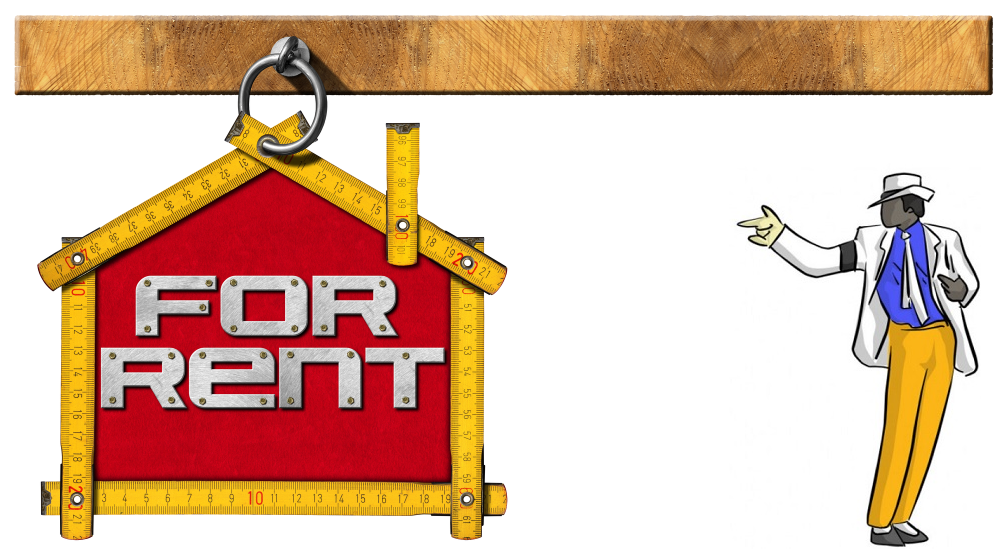
Rental Income Example
Let’s assume the property can be rented for ¥150,000 per month (similar to the rent you would have paid if you stayed in Japan).
- Annual Rental Income: ¥150,000 × 12 months = ¥1.8 million.
- 10-Year Rental Income: ¥1.8 million × 10 years = ¥18 million over 10 years.
Costs to Consider
Even though you’re earning rental income, you still have costs to cover:
- Remaining Mortgage Payments: Over the next 20 years, you would continue to pay off the mortgage, totaling ¥19.2 million (the same as if you continued living in the house).
- Property Management Fees: Assuming a 10% management fee, this would be ¥150,000 × 12 months × 10% = ¥180,000 per year. Over 10 years, that’s ¥1.8 million.
- Property Taxes: Let’s assume an annual property tax of ¥200,000 (this can vary based on the property). Over 10 years, that’s ¥2 million.
- Maintenance Costs: Maintenance costs could vary, but let’s assume 1% of property value per year, which is ¥500,000 annually for a ¥50 million property. Over 10 years, that’s ¥5 million.
Net Rental Income After 10 Years
Now let’s calculate the net rental income:
- Total Rental Income: ¥18 million (¥1.8 million per year × 10 years)
- Total Costs:
- Property management: ¥1.8 million
- Property taxes: ¥2 million
- Maintenance: ¥5 million
- Total costs = ¥8.8 million
- Net Income Over 10 Years: ¥18 million (rental income) – ¥8.8 million (costs) = ¥9.2 million.
Effect on Overall Financials
If you choose to rent out your property after leaving Japan:
- You would still have the asset (land + depreciating house), which will still be worth around ¥26 million (after 20 years).
- You would have earned ¥9.2 million in net rental income over 10 years while continuing to pay off your mortgage.
Thus, over 20 years, you would have:
- Paid ¥38.4 million in mortgage payments.
- Accumulated ¥9.2 million in rental income.
- Retained an asset (property) worth ¥26 million.
Net Position After 20 Years (with Renting It Out)
- Mortgage Payments: ¥38.4 million
- Net Rental Income: ¥9.2 million
- Remaining Property Value: ¥26 million
- Net Cost/Profit: ¥38.4 million – ¥9.2 million (rental income) = ¥29.2 million (net cost in mortgage payments after offsetting rental income).
- Final Asset Value: ¥26 million (property value).
So, after 20 years of owning the property and renting it out for 10 years, your net cost is around ¥29.2 million, but you still hold a property worth ¥26 million. This means your net position is only ¥3.2 million in costs, compared to ¥36 million in sunk rent if you had continued renting the entire time.
Conclusion
If you plan to stay in Japan long-term and have found a good property in a desirable location (urban areas with potential land appreciation), buying a property tends to make better financial sense than renting in the long run. Even though the building will depreciate, the value of the land could help you recover some of the costs, and you avoid “losing” rent money each month.
However, renting might still be better if you’re uncertain about future property values, don’t want the responsibility of home maintenance, or if your lifestyle could change within the next few years.
You can rent out your property in Japan after leaving the country, which can be a viable way to generate income and mitigate the house’s depreciation.
Renting out your property after leaving Japan can significantly reduce overall costs and generate a small net gain. While managing the property comes with its own challenges, renting it out provides a way to recover costs and continue building equity, making it a financially sound option if you’re planning to hold the property long-term.
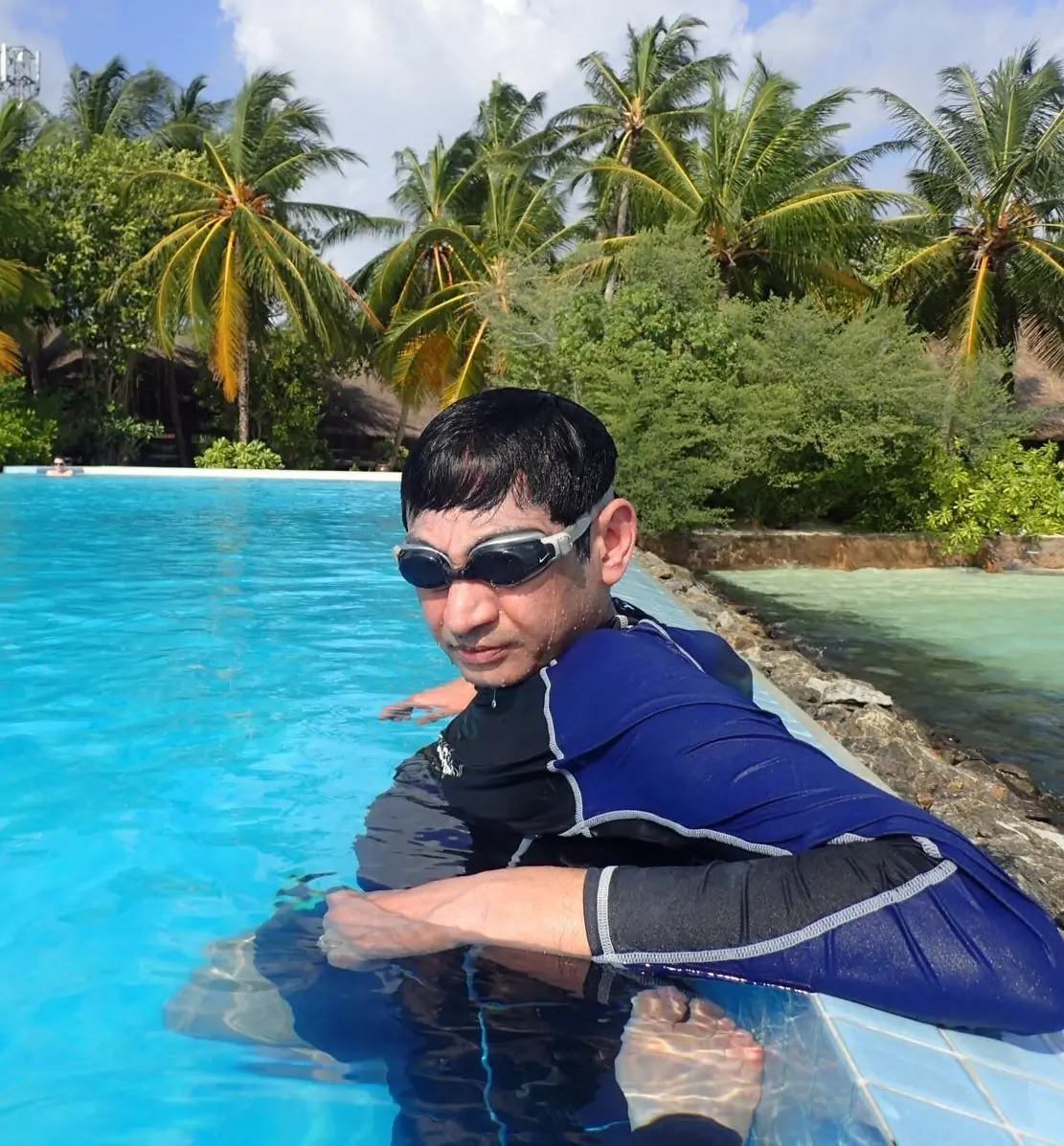
A long-term ex-pat in Japan, Himanshu comes with an IT background in SAP consulting, IT Business Development, and then running the country operations of an IT consulting multinational. Himanshu is the co-founder and Managing Director of ReachExt K.K. and EJable.com. He is also an Advisory Board Member of a Silicon Valley AI/IoT startup.
